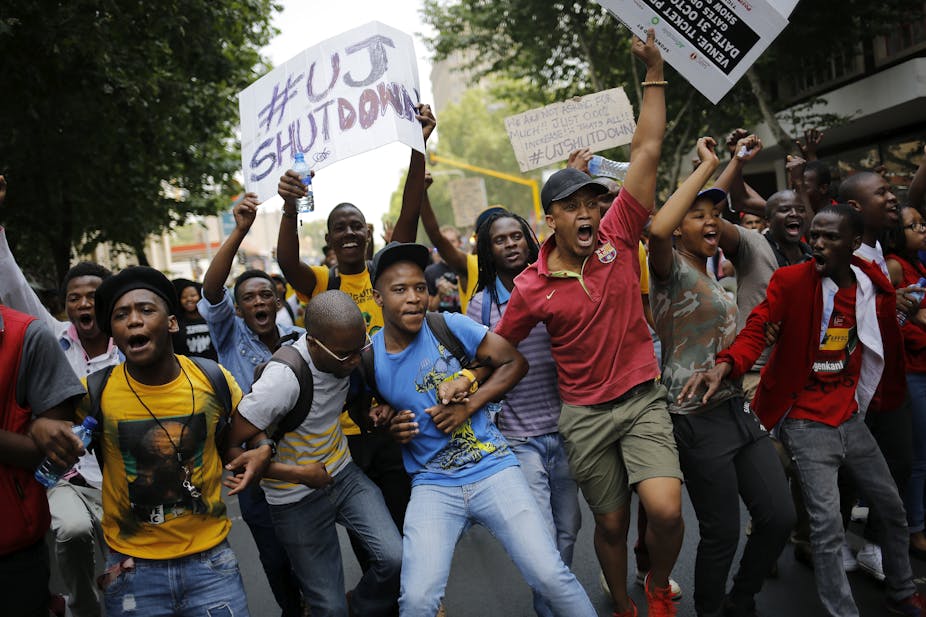It seems that South Africa’s universities are on a knife-edge once more. Its students are ready to march again.
It’s striking that universities find themselves in this position less than a year after the #feesmustfall protests. These brought the issue of rising student fees – driven by declining government support – to the fore.
South Africa’s Higher Education and Training Minister has indefinitely postponed making a highly anticipated announcement about university fees. Dr Blade Nzimande was scheduled to make an “important announcement” at a press briefing on August 12. Instead, he cancelled his briefing after meeting with students.
Students weren’t impressed by their interactions with Nzimande. Members of the SA Union of Students say they will shut down universities from August 15. They’re unhappy with Nzimande’s proposals for the 2017 fee cycle and the work that’s being done by a commission President Jacob Zuma established to investigate fee structures in higher education.
Drivers for change
These events bode ill given the important role that universities play in the country’s economy. In 2009 they contributed more than R87 billion (about US$6.5 billion at current rates) to the economy and accounted for approximately 2.1% of gross domestic product (GDP). Universities are responsible for more than 150,000 jobs, both directly – academics and support staff – and indirectly through service providers.
University graduates often enter into well-paying jobs, increasing the number of taxpayers. This is an important imperative in a country that struggles with a narrow base of taxpayers. But it doesn’t stop there.
These graduates tend to be more democratically engaged. They are healthier, more likely to be civically engaged and less likely to participate in crime. A vibrant higher education sector is essential to developing a thriving society.
Higher education is directly involved in the project of nation-building. Its research and its graduates can grapple with the legacy of apartheid, as well as the country’s institutionalised system of inequality. Universities are important promoters of transformation – increasing representation and access across lines of race, gender and sexuality. In just 20 years, South Africa’s universities have improved access to black students from 52% in 1994 to 81% as of 2014.
Without sufficient funding, all of this important work is in jeopardy.
Funding crunch
South African higher education is funded well below Organisation for Economic Cooperation and Development averages. It lags behind other African countries, too.
Currently, the South African government spends just R68.7 billion on the entire post-school training sector. Of this, expenditure on university subsidies, infrastructure and the National Student Financial Aid Scheme amount to 1% of GDP. Organisation for Economic Cooperation and Development countries spend on average 1.59% of GDP on higher education, with the UK spending 1.23% and Germany spending 1.31%.
This, combined with the fact that South Africa simply does not currently have enough capacity in higher education to meet the demand, is concerning. There are 26 universities to service a population of about 54 million people. That’s simply not enough, particularly when you consider that the median age in South Africa is between 22 and 25.
According to the 2015 Statistics South Africa Mid-Year Population Estimate, 19% of the population falls between the ages of 15 and 29 – the approximate age range for university attendance.
Comparatively speaking, Canada has 88 universities for a population of 34 million people with a median age of 39.8. In the US, there are more than 100 colleges and universities within the greater Boston area alone. The city has a median age of 31.1.
In a more similar economy, Brazil, the median age is 31.1 – and there are more than 2,300 universities.
The point is that South Africa maintains a large portion of its population at the age and stage where they are looking for and needing university education. But this demand is not being adequately funded in the context of increasing student numbers.
Increased funding is an investment
Academics appreciate the difficult situation the government finds itself in with respect to funding. Just 22% of the population pays personal income tax. The pool of public funds remains limited even when corporate income tax, which accounts for an additional 18% of government revenue, is considered.
But the time is right to think outside the box. There are alternative ways to fund higher education in South Africa.
The corporate sector directly benefits from the graduates produced by universities. So it is possible to justify thinking through approaches that include their support. The Wits University Panel on Funding Model(s) for Higher Education in South Africa recently made a submission to the Fees Commission suggesting that a “hybrid model” is required to solve the problems. Things like wealth management funds, special purpose entities and other financial instruments all offer potential funding sources.
The panel didn’t settle on one approach, making it clear that there are a plethora of options available if creative thinking is applied. Without this sort of thinking the sector’s benefit to South Africa’s economic and social develop is under threat.
We have to stay focused on the fact that to improve funding is to invest in economic growth. Adequately funding South Africa’s universities is an investment in skills development, youth development and social justice. It’s an investment in the nation’s future well-being.
It is time that higher education is seen and treated as a key tool for social justice and as a crucial aspect of South Africa’s developmental strategy. It is time for greater investment in the country’s future – not less.

